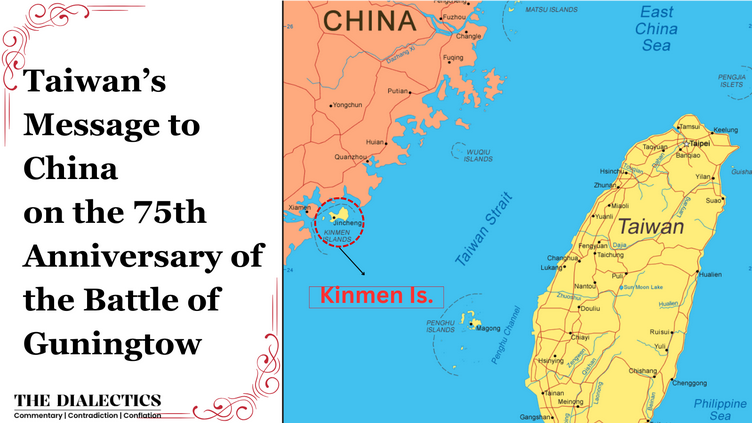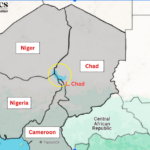In contemporary times, we often see the aggression of China towards Taiwan and China has often stated that the Communist Party of China will use military force, if necessary, towards the reunification of Taiwan into mainland China. This year Taiwan celebrated the 75th anniversary of a key strategic victory of theirs against the People’s Republic of China in 1949. During the Occasion, the recently elected President Lai Ching-te gave an important message in his commemorative speech to fellow Taiwanese, and particularly to China. To understand the significance of the given time and the relevance of the speech given by Lai Ching-te, we need to understand the importance of the battle of Guningtou also known as the battle of Quemoy.
The Battle of Guningtou / The Battle of Kinmen
The battle of Guningtou was a key strategic victory for Chiang Kai Shek’s ROC (Republic of China), over the PLA led by Mao Zedong. Mao Zedong in his quest to wipe out the Republic of China by that time had taken over entire Northern China. Mao’s army had by then crossed the great Yangtze River. Upon facing an overwhelming defeat in mainland China Chiang Kai Shek and his forces were on retreat from the PLA to Taiwan. Soon the PLA took over Xiamen, close to the coast of Xiamen is the Kinmen group of islands. Kinmen island other than Horseshoe crabs didn’t have much to offer, but at the same time was of great geographical importance, since Kinmen islands had to be taken before launching a full-scale invasion of Taiwan. So, the People’s Liberation Army without enough boats and assuming the fact that there are only around 12000 troops of the ROC stationed at the Kinmen islands, decided to launch an invasion hoping it would successfully end in one day. But the reality that they assumed was quite different, since ROC had stationed around 20000 troops at Kinmen that comprised battle hardened and trained troops.
The PLA was greeted by the Forces of ROC with Traps and mines on shores which disabled the PLA to properly establish a beachhead. The ROC was well backed by aerial as well as maritime support which enabled them to completely dismantle the efforts of the PLA to capture the Kinmen islands. After a lot of humiliating defeats in mainland China, this was a very important victory for the ROC forces since it also boosted their morale. The battle of Kinmen at the same time also set the stage for Cold war in Asia, as said by Miles Yu a military analyst, that the control of the Kinmen meant the control over the in and out sea access of the adjacent coastal areas. The battle of Guningtou also set the course of the future of Taiwan as during the cold war the US provided military and economic support to Taiwan to further strengthen its role as a bastion of anti-communist resistance. The battle was a key strategic victory for the ROC and an important lesson learned for the PLA.
Lai Ching-te’s Message
Now we shall look into the significant relevance of the speech given by the President of Taiwan in the current situation. The President of Taiwan Lai Ching-te, who took charge of the office in January this year was speaking at this event to commemorate the 75th anniversary of the battle of Guningtou. In his speech he said “the victory of the battle of Guningtou teaches us that freedom and democracy are not to be taken for granted and reminds us, we can resist authoritarianism as long as we stand united. We cannot and will not allow any external force to interfere in the future of Taiwan, Penghu, Kinmen & Matsu”.
Lai Ching-te in his past had served in the military as he was even deployed to Kinmen as a captain with the medical platoon of the 824th divisions 5th infantry Battalion, this explains his inclination towards military history. Giving the speech as the President of Taiwan in Kinmen was also reassuring the people a Democratic will as he said “we treasure a democratic and a free way of life”. He also gave the statement that “no external force can interfere in the future of Taiwan, Penghu, Kinmen & Matsu”. This statement came right after the Chinese conducted the Joint Sword 2024B exercise, in which the Eastern Theatre Command of the Chinese People’s Liberation army. The PLA had mobilized its army, navy, air-force and rocket force to conduct Joint Sword 2024B maneuvers in the Taiwan Strait as well as the Northern, Southern and Eastern sides of the island of Taiwan. Since the proximity of the islands of Kinmen and Matsu is very close to China, this makes them the most vulnerable. In the past the Republic of China’s army was successfully able to crush the PLA’s takeover of Kinmen by wiping out almost 9000 of People’s Liberation Army’s soldiers.
Though back then, the PLA was less equipped for amphibious landings and lacked aerial support, which in today’s times is not the case. At the same time Taiwan’s emergence as a production hub for semiconductor chips around the world, keeps it close to the National Interests of Major powers around the world. Beijing dislikes Lai Ching-te, often calling him a separatist and with the continuous Incursions of the PLA into Taiwanese territory makes it more important for the President to reassure the citizens and draw their morale from the victories achieved in the depths of History




